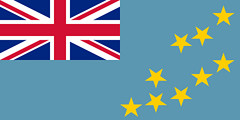Tuvalu is an island state located in the Pacific Ocean, south of the equator. The archipelago is made of nine islands, for a total area of approx. 26m2 for 11 000 inhabitants. The average height of the islands is 3 meters above sea level. The main island is Funafuti, not for its size but as it is considered the capital of the island state. Tuvalu is independent since 1978, after two centuries of British domination. The state is a member of the Commonwealth, and the head of state is Elizabeth II.
History
If signs of an early life tracing back to 8000 years were found in a cave underwater, the first signs of the Tuvaluan language appeared 2000 years ago. The islands were colonized in 1861 by Great Britain and were a strategic place for the American during the war against Japan in 1942. Thus, blocs were built on the beaches, and sand removed to build landing strips.
Population
The Tuvaluans speak English and Tuvaluan, and mainly came from the surrounding islands, many years ago.
Economy
The Tuvaluan economy is mainly based on importations, as they have nothing to export. The land cannot be cultivated. They import a lot of water, as the water that exists on the island cannot be drunk because of the infiltration of salty water. The main resource of the Tuvaluan economy is the financial aid they receive, tourism and fishing. Their currency is the Australian dollar.
Tuvalu is famous for two things. First, in 1998 it was given the title of nation “above reproach for human rights violations”. Secondly, and sadly, because some consider it might disappear under the sea. That is what we are going to talk about in our controversy.

